As an Amazon Associate, we earn from qualifying purchases with no additional costs for you.
Diamond sharpening stones are becoming a popular alternative to traditional whetstones. They are lightweight, effective, and long-lasting. Diamond sharpening stones do not require as much care as traditional stones, which contributes to the increasing interest in these stones.
Diamond stones are made from man-made or industrial-grade diamonds embedded on a rigid surface. Diamond stones effectively cut all types of steel, even extremely hard Japanese steel. These stones are durable and easy to use, clean, and store, making them a good sharpening option for most people.
If you are considering investing in diamond stones for your knife sharpening, we have the information you need to help you decide whether these stones are right for you. We will also give you some insight into their durability and how to store, clean, and take care of these sharpening tools.
If you are interested in checking out the best diamond sharpening stones (Atoma) you can find them by clicking here (Amazon link).

What Is A Diamond Sharpening Stone?
Considering that traditional stone whetstones have been around for many hundreds of years, diamond sharpening stones are a recent addition to the knife sharpening world.
Initially, diamond stones were quite expensive, and purist knife sharpeners looked at these stones with some skepticism. However, the quality and effectiveness of these stones have proved themselves and resulted in their growing popularity among knife owners.
Let’s examine how these diamond sharpening stones are produced, whether they are any good, types of stones, and how to take care of your diamond stones should you purchase a set.
How Are Diamond Sharpening Stones Made?
Diamond sharpening stones are made from synthetic diamonds embedded in a metal or rigid plastic backing plate. Natural diamonds are expensive precious stones, so making diamond sharpening stones from these natural gemstones would make them prohibitively expensive.
Consequently, diamond sharpening stone abrasives are made from synthetic or man-made diamonds to keep them affordable. These stones are created in a lab where chemicals, carbon, and gases are treated with heat in a fairly complex process to create synthetic diamonds.
There are different qualities of man-made diamonds, and the quality is generally determined by the purpose for which the diamonds are created. There are two major types of synthetic diamonds: polycrystalline and monocrystalline diamonds.
Monocrystalline diamonds are more complex and expensive to make, but they are the best diamonds for sharpening stones. Polycrystalline diamonds are easier to manufacture, but they fracture and break more easily and are generally used in grinding pastes.
Some diamond stones are manufactured by bonding the diamonds to the backing plate with adhesives. In contrast, others use an electroplating process to embed the diamonds in the surface of the metal plate.
In the adhesive method, the baseplate is covered with an adhesive over which the diamonds are sprinkled, and the adhesive is dried.
This is the cheapest way to make diamond sharpeners, but these stones do not last very long since the diamonds are relatively easily dislodged from the adhesive.
Electroplating is where the diamonds are suspended in molten nickel. The baseplate is submerged in the molten nickel/diamond mix, and an electric current is passed through the metal, causing the nickel and diamonds to bond to the surface of the metal base plate.
This electroplated bond embeds the diamonds in the nickel, where they are not easily dislodged, producing a more durable sharpening stone.
Are Diamond Sharpening Stones Good?
There are lower-quality cheap versions and more expensive, higher-quality versions, as with any manufactured product. The same is true of diamond sharpening stones.
Diamond stones made with monocrystalline diamonds bonded with electroplating are high-quality stones that work effectively to repair, sharpen, and hone even the hardest steel. Polycrystalline diamond stones bonded with adhesive are less effective and less durable.
Quality diamond stones are very effective sharpening tools and cut steel easily and fast. Sharpening and other edge repair or maintenance tasks are much quicker on diamond stones than on other abrasives.
While diamond stones work great for repairing, sharpening, and honing the edge of a knife, there is a limit to the grit fineness to which these stones can be produced.
For this reason, many professional knife sharpeners will use diamond stones for repairing an edge and sharpening an edge and even the initial honing, but a high-grit Waterstone will be used to put the mirror finish on the edge.
The cutting ability of the diamonds is too effective to produce a highly polished finish on the edge. At most, you can expect a satin finish, which in some cases is not enough for the desired finish on the knife edge.
TIP: Using your diamond stones properly is really important to get the best results. Common questions among knife sharpeners are: Push or pull when sharpening a knife? Find out the answer in the article below:
Push Or Pull When Sharpening A Knife? Correct Way Explained
Types of Diamond Sharpening Stones
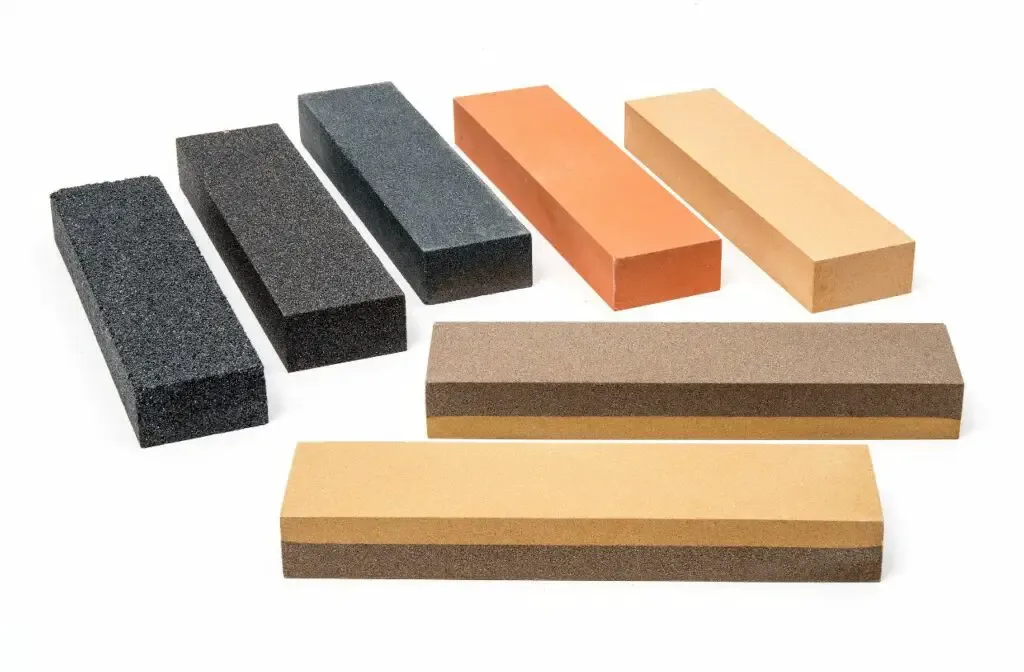
There are many shapes and configurations of diamond stones, but the most common form of flat diamond stones generally comes in two formats.
The two main diamond sharpening stones are interrupted surface and continuous surface diamond stones. Interrupted surface stones have holes or hollows to remove sharpening swarf from the surface. Continuous surface stones do not have holes but a continuous, diamond-embedded surface.
What are the primary differences between these types of diamond stones, and which would be the better choice?
Interrupted Surface Diamond Stones
Interrupted surface diamond stones have hollows or holes in the surface of the abrasive plate. These holes are intended to catch the waste metal from the sharpening process to keep the abrasive surface clean and cutting effectively.
These diamond plates are often mounted on a plastic or acrylic base to provide a rigid backing for the relatively thin plate. The acrylic base can be fairly thin in some cases, which results in these sharpeners being referred to as diamond plates rather than diamond stones.
The quality of the diamonds and the methods of bonding the diamonds to the surface of the plate vary from manufacturer to manufacturer. The higher-quality diamond plates will have monocrystalline diamonds bonded via electroplating.
Continuous Surface Diamond Stones
Continuous-surface diamond stones do not have an interrupted surface and are generally electroplated stones with a metal backing.
These stones are often preferred by people who sharpen knives regularly since the stones are easily secured on a work surface for repetitive work.
Some cheaper stones use lower-quality diamonds or have a limited number of diamonds embedded in the nickel plating.
Quality stones of this type use higher-quality monocrystalline diamonds and have a higher ratio of diamonds on the sharpening surface. These would be the preferred stones of this type, so you need to research the quality of the stones you are purchasing.
The continuous surface stones also come in thin and thick base versions, and when they have a thin base, they are referred to as diamond plates rather than stones. The thicker-base versions are made to fit comfortably into bases intended for use with standard water stones.
TIP: Are you interested in buying diamond sharpening stones for your knives? Check out the ultimate buyer’s guide about diamond stones and choose the one that suits you the best:
Buyer’s Guide: Best Diamond Knife Sharpening Stones Set
How Long Do Diamond Sharpening Stones Last?
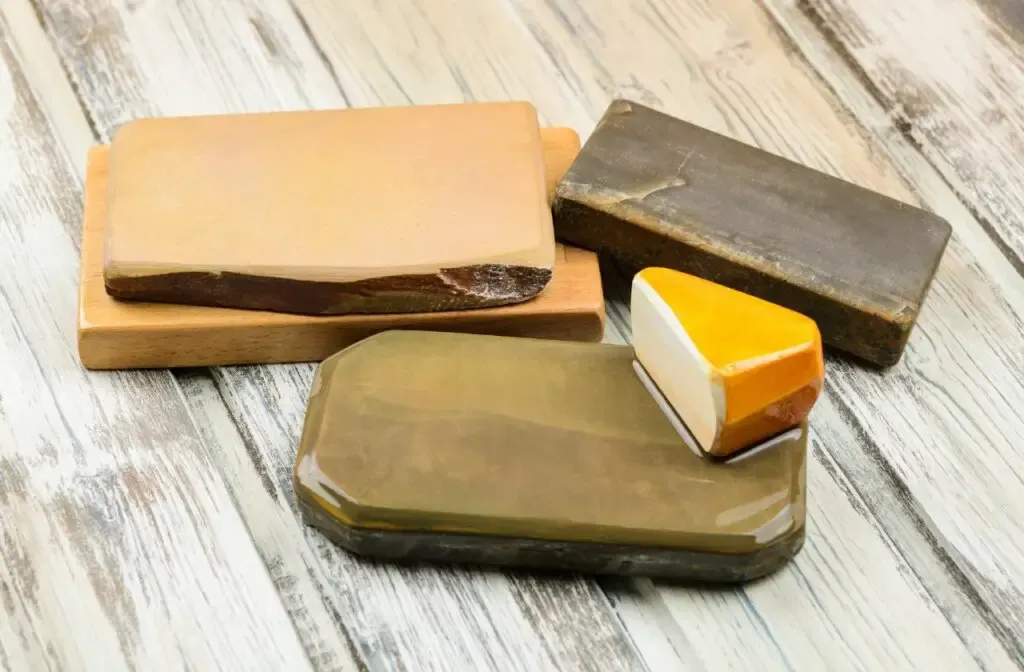
The length of time that a diamond stone will last will essentially depend on the quality of the diamond stone. The frequency with which the stones are used will also influence the life span of the diamond stones.
Diamond stones can last anywhere from a few years to between 10 and 20 years. The lifespan of the stones will depend on how heavily the stones are used. Diamond stones are durable and, with the same frequency of use, can outlast sharpening stones made from other abrasives.
Contrary to the statement that diamonds are forever, your diamond sharpening stones will not last forever! The diamond abrasive will wear down over time and gradually become less effective at sharpening your knives.
Even though diamonds are extremely tough and durable, the constant friction of the steel across the abrasive will eventually wear down the coarseness of the diamonds. This will reduce the efficiency with which the diamonds can remove material from the blade.
PRO TIP: We personally use diamond plates by Atoma. They are quite expensive but of the top quality with very long service life.
The initial costs are higher but you have an option of buying replacing diamond skin for all Atoma plates. The costs of replacing diamond skin are much lower than the cost of buying a new diamond plate.
So if you are going to use diamond plates regularly and want to get the best quality on the market, check out the four Atoma diamond plates listed below (Amazon links).
- Atoma Diamond Sharpener Coarse Grade 140 Grit
- Atoma Diamond Sharpener Medium 400 Grit
- Atoma Diamond Sharpener Fine 600 Grit
- Atoma Diamond Sharpener Super Fine 1200 Grit
These 4 diamond sharpening stones are all you need to have for repairing or sharpening your knives.
Do Diamond Sharpening Stones Wear Out?
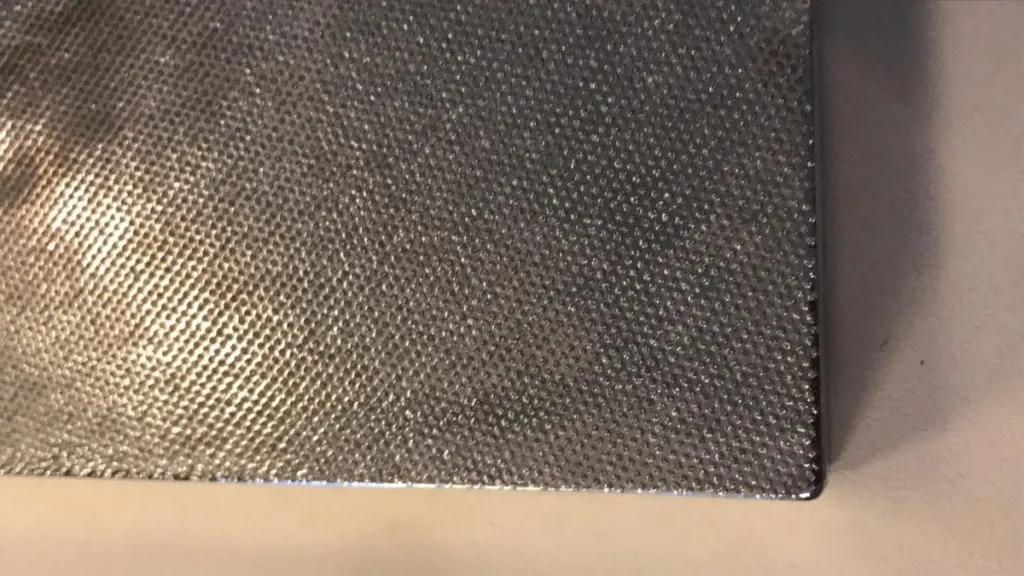
Diamonds are a tough and durable material, but due to the nature of the work that sharpening stones do, the stones will inevitably suffer wear.
Diamond stones last a long time, but they will eventually wear out. The sharp, cutting edges of the diamond fragments become worn down or knocked off through use. However, it can take years of use for this to happen. Diamond stones do not become dished, requiring the stone to be flattened.
Other whetstones wear unevenly as the stone is used, causing dishing or hollowing in the most used areas of the stone. This type of wear generally requires the stone to be flattened to restore the stone for effective sharpening.
Diamond stones do not suffer from this type of wear due to their method of construction and the materials used. This is one of the main advantages of using diamond stones over other whetstone types.
However, over time, the diamond abrasive wears down, and the sharp edges of the diamond fragments become rounded, reducing the cutting ability of the stone. When the diamond stone reaches this stage, it must be replaced since the surface cannot be restored.
This is one area where a normal whetstone has an advantage over diamond stones. As the surface material is worn away, it is replaced by fresh, new grit in the lower layers of the stone.
TIP: Diamond sharpening stones last a long time. But what about other knife sharpeners? Do they wear out faster? Find out the answer in the article below:
Do Knife Sharpeners Wear Out? Answer for Various Sharpeners
How To Clean Diamond Sharpening Stones
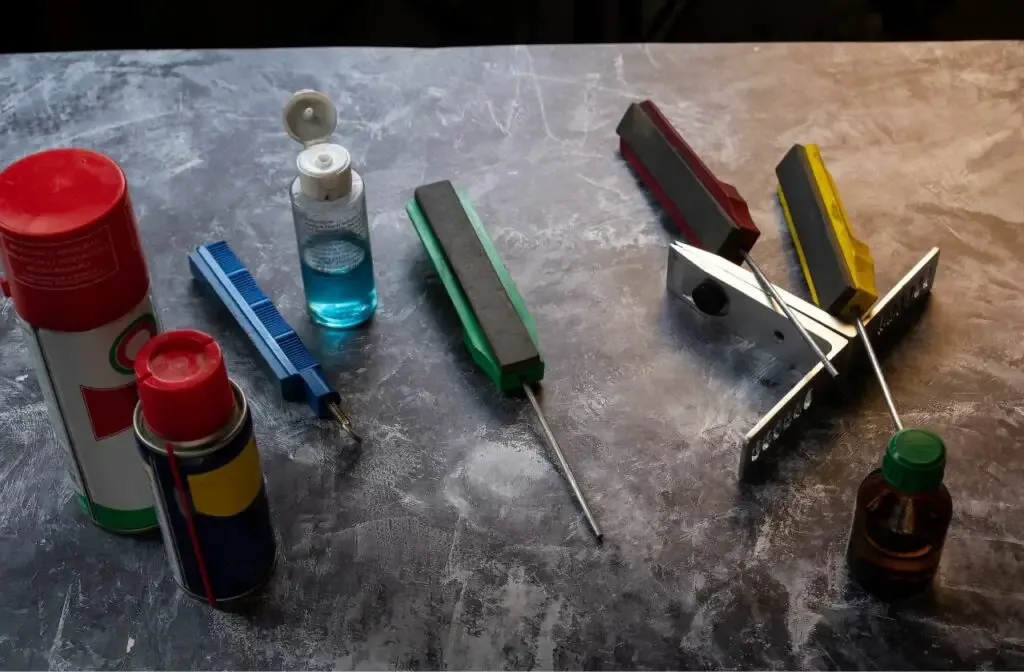
The cleaning of diamond stones is relatively easy if you only use water as a lubricant for sharpening. If you have used oil on your diamond stones, the cleaning process may take a little longer, but you can use the same method indicated below.
The best way to clean diamond sharpening stones is to wash the stones in some warm, soapy water. Stubborn waste material caked on the stone car was scrubbed off with an old toothbrush. This is mostly only required on interrupted surface stones rather than continuous surface stones.
Once the diamond stones have been washed, wipe them down with a clean, dry cloth and let them air-dry in a location where there is airflow to evaporate any residual moisture.
Some people do not like to use water as a lubricant on their diamond stones because it causes the metal base plates to rust.
While this is a possibility with some diamond stones, you should have no trouble with rust if you clean your diamond stones after use and dry them properly.
Interrupted surface plates generally have more of a problem with rust when the water infiltrates the space between the surface plate and the base plate of the diamond stone. However, if the stone is dried properly after use and washing, it will limit the potential for rust to occur.
BTW: If you want to know more about Japanese and other knives and their sharpening, check out the books listed above. These books are recommended by professional sharpeners and knife makers (Amazon links):
- Japanese Kitchen Knives: Essential Techniques and Recipes
- The Knifenerd Guide to Japanese Knives
- Knife: The Culture, Craft, and Cult of the Cook’s Knife
- Sharp: The Definitive Introduction to Knives, Sharpening, and Cutting Techniques, with Recipes from Great Chefs
Can You Use WD40 on a Diamond Stone?
Many people use lubricants other than water on their Diamond stones, including substances such as mineral oil. WD-40 is another product that some people use, but is this product suitable for use on a diamond stone?
WD-40 can be used as a lubricant on a diamond stone. Manufacturers recommend that if WD-40 is used on the diamond stone that the stone is cleaned afterward and the WD-40 removed. WD-40 has been known to dry to a sticky paste if left on the diamond stone.
Consequently, you should not use WD-40 as a means to keep the rust off your stones. Never spray your diamond stones with WD-40 before storing them. The WD-40 will become gummy on the stone’s surface and may be very difficult to remove.
TIP: A lot of knife owners use WD-40 lubricant for cleaning their pocket knives. Check out a simple guide on how to lubricate your pocket knife in the article below:
Lubricating a Pocket Knife in Three Steps: Can You Use WD-40?
How To Store Diamond Sharpening Stone
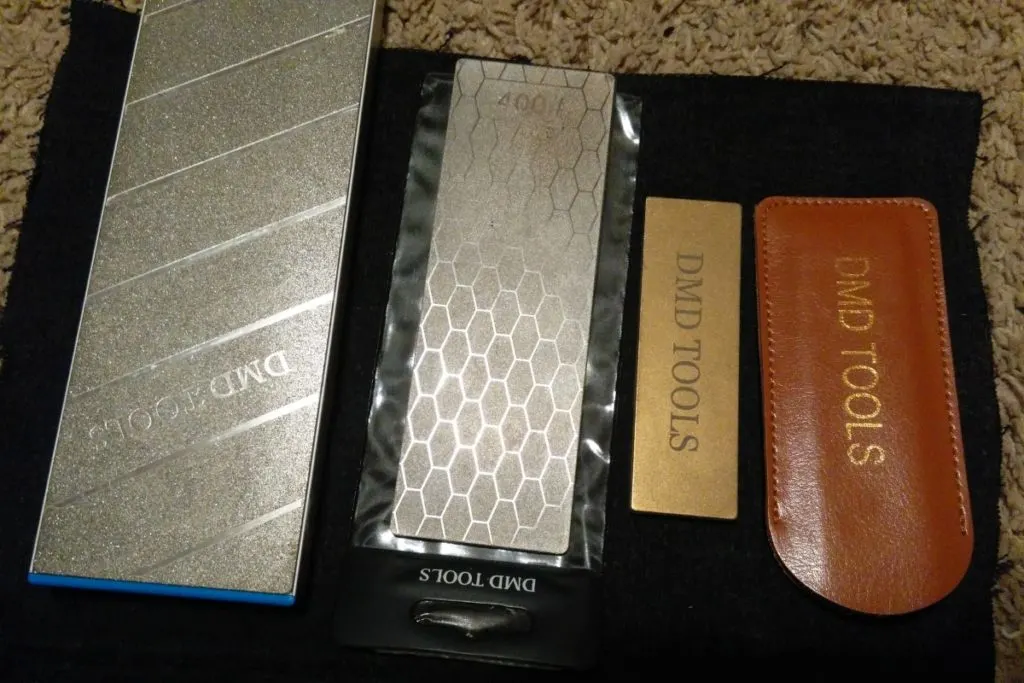
If you have a set of diamond stones, what is the best way to store them to prevent damage or prevent the stones from causing damage to other items?
Diamond stones must be clean and dry before storage. The best way to store diamond stones is to wrap each stone in a soft cotton cloth. Wrap each stone separately in a cloth, then wrap all your stones together in another cloth, preventing the stones from damaging each other or any other items.
Diamond stones are relatively easy to store in comparison to other whetstones. You do not need to worry about cold temperatures cracking your stones or the stones breaking from being dropped.
So long as your diamond stones are clean and dry, wrapping them individually in a cotton cloth will protect the stones from damaging each other and help keep the stones clean for the next use.
Diamond Sharpening Stones: FAQs
Q: What are Diamond Sharpening Stones Used For?
A: Diamond sharpening stones are utilized for honing and sharpening the edges of various tools and knives. They are renowned for their durability and efficiency in sharpening even the hardest materials, such as high-carbon stainless steel, due to the hardness of diamonds.
Q: How Do Diamond Sharpening Stones Differ from Traditional Whetstones?
A: Unlike traditional whetstones, diamond sharpening stones do not wear down or dish with use, ensuring a flat surface for consistent sharpening. They also tend to sharpen tools and knives faster due to the hardness and abrasive nature of diamonds.
Q: Can Diamond Sharpening Stones be Used Without Lubrication?
A: While diamond sharpening stones can be used dry, using a lubricant (often water or a sharpening oil) is recommended to prevent the metal filings from clogging the stone’s surface and to enhance the smoothness of the sharpening process.
Q: How Often Should Diamond Sharpening Stones be Replaced?
A: The longevity of diamond sharpening stones can vary based on usage and quality. High-quality stones, when used and maintained properly, can last anywhere from a few years to over a decade.
Q: Are Diamond Sharpening Stones Suitable for All Types of Knives?
A: Yes, diamond sharpening stones are versatile and can be used to sharpen various types of knives and tools, including those made from hard materials like high-carbon steel. However, the grit selection should be appropriate for the specific sharpening needs.
Q: How Do I Maintain and Clean My Diamond Sharpening Stone?
A: Diamond sharpening stones can be cleaned with a soft brush, soap, and warm water to remove metal filings. Ensure the stone is thoroughly dried before storing it to prevent rust, especially for stones with a metallic base.
Q: Can Diamond Sharpening Stones Damage My Knives?
A: When used correctly, diamond sharpening stones should not damage your knives. However, using excessive pressure, or utilizing a grit that is too coarse for the task, can potentially harm the blade.
Q: What Grit Should I Choose for My Diamond Sharpening Stone?
A: The grit selection should be based on your sharpening needs. Coarse grits (e.g., 140-400) are suitable for repairing and reshaping edges, medium grits (e.g., 600-800) for general sharpening, and fine grits (e.g., 1000+) for honing and polishing.
Q: Are More Expensive Diamond Sharpening Stones Necessarily Better?
A: Not always. While pricier stones often indicate higher quality or durability, your selection should be based on specific needs, usage, and budget. Some affordable stones also offer commendable performance and durability.
Q: Can I Use a Diamond Sharpening Stone for Ceramic Knives?
A: Yes, diamond sharpening stones are one of the few sharpeners hard enough to effectively sharpen ceramic knives. Ensure to use a fine grit and gentle strokes to avoid chipping the ceramic material.
Conclusion
Diamond stones are worth the additional purchase price due to the advantages offered to people sharpening their own knives. The stones make the sharpening job faster due to the cutting efficiency of the diamond abrasive. Diamond stones are also easy to clean and store.
While diamond stones do a great job of repairing edges and sharpening, they are not as good as Waterstones for putting a mirror finish on the cutting edge of a knife.
If you want to take the edge of your cutting tools to this level, a high-grit finishing Waterstone makes the perfect partner for your diamond stone sharpening set!
Now you know how to care for diamond sharpening stones properly. Do you know how to use them correctly? Check out the complete DIY guide on how to use diamond sharpening stones in the article below:
DIY Guide: Using Diamond Knife Sharpening Stone Like A PRO
